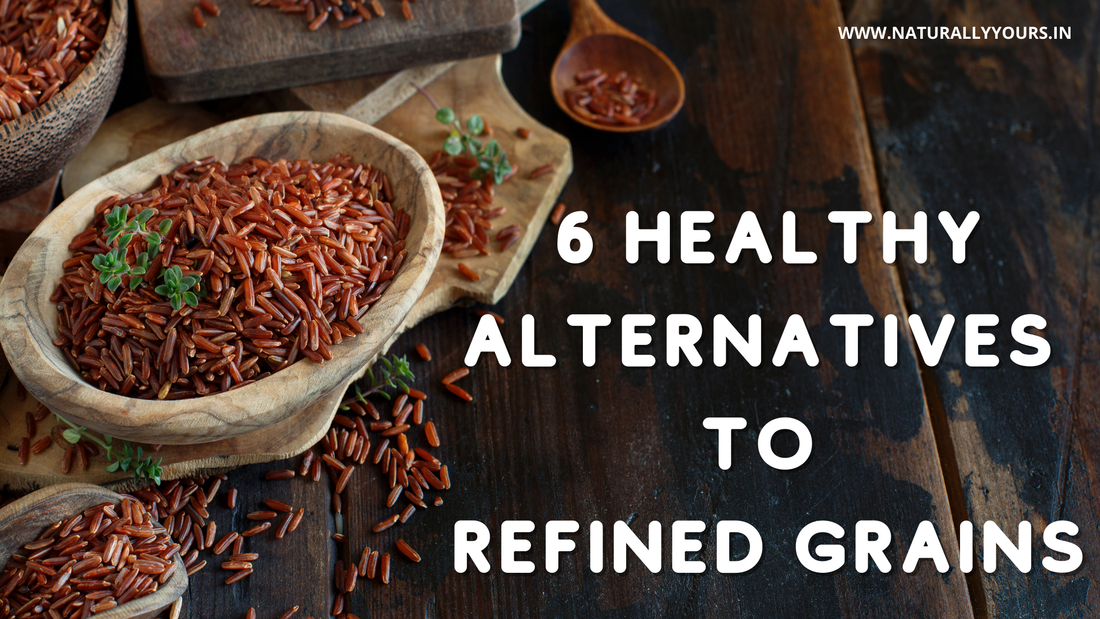
6 Healthy alternatives to refined grains
Naturally YoursShare

Various studies have shown that our food choices have a direct impact on our health. It can either help to build immunity and keep nutrient deficiencies away or lead us on a slippery path towards obesity and chronic diseases. Hence, it is highly essential to not only include nutritious whole-grains, fruits, vegetables, dry fruits etc in our daily diet but also to completely avoid or limit refined grains and sugary cereals.
Whole-grains, as the name implies, contain all the components of a grain ie bran, germ and endosperm. They are a good source of fiber, proteins, vitamins and minerals. Since they are high in fiber, they help you to stay fuller for a longer period of time. Thus reducing appetite and helping in weight management. Another benefit of whole-grains is that they promote a gradual release of sugars in the blood thereby reducing the risk of diabetes.
Refined grains, on the other hand, are stripped of the nutritious bran and germ layers of the grain. They contain only the endosperm which basically provides only carbohydrates and negligible amounts of the other nutrients. Apart from being low in nutrition, refined flours like maida, are produced with the aid of harmful chemicals during the bleaching process. They can cause a sudden spike in blood sugar and hence regular consumption of refined grains have shown a increased risk of diabetes. They can also lead to obesity and constipation.
Below are 6 healthy whole-grains that would make an ideal replacement for refined grains like white rice and maida.
- Black rice
Black rice is an ideal alternative to white rice. Its purple-black hue is due to the presence of anthocyanins, which are powerful antioxidants and protect the body against various chronic diseases. Since it has its bran layer intact, it is also a good source of fiber, protein, vitamins and minerals.
How to cook: Add 3 cups water to 1 cup black rice. Pressure cook on high flame for 5-6 whistles, then simmer for 10-15 minutes.
- Millets
Millets are one of the highest in terms of protein content and quality. They are also an excellent source of calcium. Some of the traditional varieties of millets in India are foxtail millet, little millet, kodo millet, barnyard millet, proso millet, ragi, bajra and jowar.
How to use : Traditionally millets are sprouted and ground to make porridge for babies as a weaning food. Sprouting increases the bioavailability of nutrients in the millets thus increasing its health benefits manifold. It is not only highly nutritious but also easy to digest for the young ones.
Millets can also be cooked and consumed like rice. It can be ground into flour, which can be used for making roti, cookies, cakes, malt, dosa etc. Ragi malt is a simple, delicious and nourishing health drink suitable for all ages.
- Quinoa
Quinoa is one of the best sources of plant based proteins. It is called a complete protein because it contains sufficient amounts of all the essential amino acids. Apart from proteins, it is also an excellent source of dietary fibers, antioxidants, vitamins and minerals.
Quinoa does not have dominating taste of its own and hence can be used in a variety of dishes like salad, pulao, upma or it can be used in the flour form in chapathi, dosas etc.
How to cook: Wash the quinoa under running tap water 2 or 3 times. In a saucepan, add 1 cup of water for 1/2 cup of quinoa (2:1 ratio of water and quinoa). When water starts boiling, reduce the flame to low. Cover and cook simmered for 15 minutes or until the entire liquid are absorbed. Let it sit for 10 minutes and then fluff it with a fork. Fluffy, light and tasty Quinoa is now ready.
- Buckwheat
Buckwheat or kuttu is a gluten free and highly nutritious seeds. It is a good source of protein and dietary fiber. It is also a good source of magnesium and promotes cardiac health.
It can be used in the flour form to make roties, puris or in baked goods. Buckwheat groats/hulled buckwheat can be cooked and consumed as an alternative to white rice.
How to cook: Roast the buckwheat groats in low flame for about 5-6 minutes till light golden in colour. Add 1.5 cups of water for 1 cup of buckwheat. When water starts boiling, reduce the flame to low. Cover and cook simmered for 15 minutes or until the entire liquid are absorbed.
- Oats
Whole oats/Rolled oats/steel cut oats are one of the healthiest breakfast options. Apart from being gluten free and high in fiber, they offer a host of other health benefits as well. They are a good source of vitamins, minerals and proteins. They aid in digestive health, weight management and help to prevent constipation. They are super easy to prepare either as a sweet or savory meal.
How to cook : In a medium saucepan, bring 2 cups of water or milk to a gentle boil. Add 1 cup whole/steel cut oats and stir. Cover and simmer for 20-30 minutes until the oats reach the desired level of doneness (20 minutes for chewy oats, 30 minutes for a more creamy consistency. Rolled oats need a much shorter cooking time since they are pre-steamed. They would be ready in around 5 to 10 minutes.
- Amaranth
Amaranth is a gluten free grain which is high in protein (15-18%). It is also a good source of calcium, fiber, iron, potassium, and many other vitamins and minerals.
How to cook: Add 2 cups water to 1 cup amaranth grain, bring to a boil, then simmer for 15-20 minutes
So make a healthful choice and replace refined grains with these nutritious whole-grains because simple tweaks in your daily diet can help you to lead a wholesome life.
Trending Articles
1) Morning habits to help you lose weight - Read Now
2) 5 Natural fixes for more energy - Read Now
3) 10 Evidence Based Weight Loss Tips - Read Now



